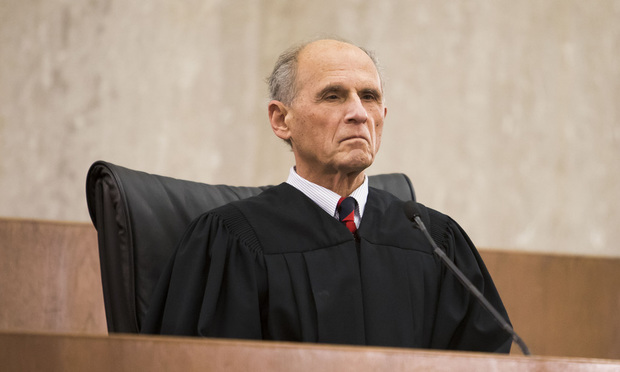DC Circuit Won't Overturn Trump Appointees' Ruling for Barr's Death Penalty Protocol
Judge David Tatel said he believes the case is "en banc worthy" but should not be delayed after the U.S. Supreme Court asked the circuit to "render its decision with appropriate dispatch."
May 15, 2020 at 11:44 AM
4 minute read
 Judge David Tatel of the U.S. District Court for the District of Columbia/photo by Diego Radzinschi
Judge David Tatel of the U.S. District Court for the District of Columbia/photo by Diego Radzinschi
The U.S. Court of Appeals for the D.C. Circuit on Friday denied a request for an en banc rehearing of a challenge to Attorney General William Barr's new federal death penalty protocols, with one judge pointing to the U.S. Supreme Court's direction for the court to not hold up the case.
A three-judge panel on the court ruled 2-1 earlier this year to lift a preliminary injunction placed on the protocols, which would allow federal executions to resume. Judges Neomi Rao and Gregory Katsas, both appointed by President Donald Trump to the bench, disagreed on their legal reasoning but came to the same conclusion on lifting the injunction.
Judge David Tatel disagreed with that finding, and in a dissenting opinion said he believed the protocol is "contrary" to federal death penalty law. He issued a statement with Friday's order saying he believes the case "is en banc worthy" but "did not call for a vote because, given that the Supreme Court directed this court to proceed 'with appropriate dispatch,' I agree that '[our] review should be concluded without delay.'" Chief Judge Sri Srinivasan did not participate in consideration of the petition.
Barr announced last year the adoption of new federal execution policies, which were quickly challenged in federal court. U.S. District Judge Tanya Chutkan issued a preliminary injunction blocking the protocol, and both the D.C. Circuit and the U.S. Supreme Court denied Department of Justice's motions to stay that ruling. The justices said in December they expected the circuit court to "render its decision with appropriate dispatch."
In a statement issued with the Supreme Court's findings written by Justice Samuel Alito and joined by Justices Neil Gorsuch and Brett Kavanaugh, the justices said they believed the Justice Department "is very likely to prevail when this question is ultimately decided."
"Nevertheless, in light of what is at stake, it would be preferable for the District Court's decision to be reviewed on the merits by the Court of Appeals for the District of Columbia Circuit before the executions are carried out," the justices said.
Hogan Lovells appellate attorney Catherine Stetson argued the case before the D.C. Circuit in January. In the petition for an en banc rehearing of the case, signed by attorneys from Hogan Lovells, Wilmer Cutler Pickering Hale and Dorr, KaiserDillon and federal defenders, lawyers argued the panel opinion "conflicts with Supreme Court and D.C. Circuit precedent and will carry grave and irremediable consequences."
"The upshot: In its haste to uphold the protocol, the panel majority disregarded foundational principles of statutory interpretation, administrative law, and judicial review. These errors are troubling in their own right, as they could affect a wide range of this court's administrative-law cases," the petition filed last month reads. "But the consequences here are far more imminent and grave. The panel's decision will allow the government to execute scores of federal inmates pursuant to an unlawful protocol."
In a filing last week, the Justice Department urged the circuit to uphold the panel opinion. "If plaintiffs wish to attempt to persuade the Supreme Court that Judge Tatel's dissenting views are correct, they are free to seek further review there," the DOJ lawyers wrote. "But this court should not frustrate the Supreme Court's expectation that this court would render a decision with dispatch, by engaging in lengthy en banc proceedings to second-guess rulings that present neither a conflict with governing precedent nor questions of exceptional importance."
Stetson said in a statement Friday that the legal challenge to the protocol will continue. "The Court of Appeals' fractured decision leaves many questions about the legality of the government's execution protocol unresolved," she said. "We will be actively assessing all available avenues to ensure that no federal executions take place until the courts have had an opportunity to review all outstanding issues."
This content has been archived. It is available through our partners, LexisNexis® and Bloomberg Law.
To view this content, please continue to their sites.
Not a Lexis Subscriber?
Subscribe Now
Not a Bloomberg Law Subscriber?
Subscribe Now
NOT FOR REPRINT
© 2025 ALM Global, LLC, All Rights Reserved. Request academic re-use from www.copyright.com. All other uses, submit a request to [email protected]. For more information visit Asset & Logo Licensing.
You Might Like
View All
Weil Adds Acting Director of SEC Enforcement, Continuing Government Hiring Streak
3 minute read

Law Firms Expand Scope of Immigration Expertise Amid Blitz of Trump Orders
6 minute readLaw Firms Mentioned
Trending Stories
Who Got The Work
J. Brugh Lower of Gibbons has entered an appearance for industrial equipment supplier Devco Corporation in a pending trademark infringement lawsuit. The suit, accusing the defendant of selling knock-off Graco products, was filed Dec. 18 in New Jersey District Court by Rivkin Radler on behalf of Graco Inc. and Graco Minnesota. The case, assigned to U.S. District Judge Zahid N. Quraishi, is 3:24-cv-11294, Graco Inc. et al v. Devco Corporation.
Who Got The Work
Rebecca Maller-Stein and Kent A. Yalowitz of Arnold & Porter Kaye Scholer have entered their appearances for Hanaco Venture Capital and its executives, Lior Prosor and David Frankel, in a pending securities lawsuit. The action, filed on Dec. 24 in New York Southern District Court by Zell, Aron & Co. on behalf of Goldeneye Advisors, accuses the defendants of negligently and fraudulently managing the plaintiff's $1 million investment. The case, assigned to U.S. District Judge Vernon S. Broderick, is 1:24-cv-09918, Goldeneye Advisors, LLC v. Hanaco Venture Capital, Ltd. et al.
Who Got The Work
Attorneys from A&O Shearman has stepped in as defense counsel for Toronto-Dominion Bank and other defendants in a pending securities class action. The suit, filed Dec. 11 in New York Southern District Court by Bleichmar Fonti & Auld, accuses the defendants of concealing the bank's 'pervasive' deficiencies in regards to its compliance with the Bank Secrecy Act and the quality of its anti-money laundering controls. The case, assigned to U.S. District Judge Arun Subramanian, is 1:24-cv-09445, Gonzalez v. The Toronto-Dominion Bank et al.
Who Got The Work
Crown Castle International, a Pennsylvania company providing shared communications infrastructure, has turned to Luke D. Wolf of Gordon Rees Scully Mansukhani to fend off a pending breach-of-contract lawsuit. The court action, filed Nov. 25 in Michigan Eastern District Court by Hooper Hathaway PC on behalf of The Town Residences LLC, accuses Crown Castle of failing to transfer approximately $30,000 in utility payments from T-Mobile in breach of a roof-top lease and assignment agreement. The case, assigned to U.S. District Judge Susan K. Declercq, is 2:24-cv-13131, The Town Residences LLC v. T-Mobile US, Inc. et al.
Who Got The Work
Wilfred P. Coronato and Daniel M. Schwartz of McCarter & English have stepped in as defense counsel to Electrolux Home Products Inc. in a pending product liability lawsuit. The court action, filed Nov. 26 in New York Eastern District Court by Poulos Lopiccolo PC and Nagel Rice LLP on behalf of David Stern, alleges that the defendant's refrigerators’ drawers and shelving repeatedly break and fall apart within months after purchase. The case, assigned to U.S. District Judge Joan M. Azrack, is 2:24-cv-08204, Stern v. Electrolux Home Products, Inc.
Featured Firms
Law Offices of Gary Martin Hays & Associates, P.C.
(470) 294-1674
Law Offices of Mark E. Salomone
(857) 444-6468
Smith & Hassler
(713) 739-1250









